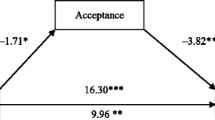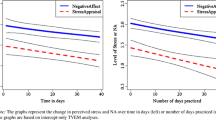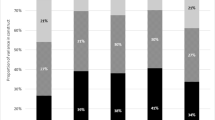Abstract
This randomized controlled trial examined the effects of mindfulness on anhedonic symptoms in a sample of adults reporting high levels of chronic stress. Meditation-naïve adults (N = 68, Mage = 32, 62% female) were randomized to either an 8-week group-based MBSR intervention (N = 35), or a waitlist control group (N = 33). We hypothesized that changes in mindfulness would mediate the relationship between condition and changes in anhedonic symptoms. Additionally, the present study aimed to determine if other theoretically linked mechanisms (i.e., stress, negative affect [NA], depression) were involved in producing changes in anhedonic symptoms. Results provided evidence for full mediation of the effect of MBSR on social anhedonia through its essential mechanism of ΔMindfulness. These results highlight specificity of anhedonic symptoms targeted by MBSR, with social anhedonia symptoms being modified by changes in mindfulness whereas other anhedonic domains were not. The specificity of effects to the social anhedonia domain may be in part due to the group-based nature of MBSR. Additionally, although associative relationships were present for stress, depression, NA, and anhedonic symptoms, no mediational relationships emerged. Results presented here should be evaluated in light of study limitations, such as the reliance on self-report measures as well as a lack of information regarding cultural or geographic diversity.



Similar content being viewed by others
References
American Psychiatric Association. (2013). Diagnostic and statistical manual of mental disorders (5th ed.). American Psychiatric Association.
Baer, R. A., Carmody, J., & Hunsinger, M. (2012). Weekly change in mindfulness and perceived stress in a mindfulness-based stress reduction program. Journal of Clinical Psychology, 68(7), 755–765.
Baer, R. A., Smith, G. T., Hopkins, J., Krietemeyer, J., & Toney, L. (2006). Five Facet Mindfulness Questionnaire. Assessment, 13, 27–45.
Baer, R. A., Smith, G. T., Lykins, E., Button, D., Krietemeyer, J., Sauer, S., & Williams, J. M. G. (2008). Construct validity of the five facet mindfulness questionnaire in meditating and nonmeditating samples. Assessment, 15(3), 329–342.
Baron, R. M., & Kenny, D. A. (1986). The moderator–mediator variable distinction in social psychological research: Conceptual, strategic, and statistical considerations. Journal of Personality and Social Psychology, 51(6), 1173.
Beck, A. T., Steer, R. A., & Brown, G. (1996). Beck depression inventory–II. Psychological Assessment.
Berenbaum, H., & Connelly, J. (1993). The effect of stress on hedonic capacity. Journal of Abnormal Psychology, 102(3), 474.
Bogdan, R., & Pizzagalli, D. A. (2006). Acute stress reduces reward responsiveness: Implications for depression. Biological Psychiatry, 60(10), 1147–1154.
Brewer, J. A., Van Dam, N. T., & Davis, J. H. (2015). Mindfulness and the addictive process: Psychological models and neurobiological mechanisms. In B. Ostafin, M. Robinson, & B. Meier (Eds.), Handbook of Mindfulness and Self-Regulation. New York, NY: Springer.
Britton, W. B., Shahar, B., Szepsenwol, O., & Jacobs, W. J. (2012). Mindfulness-based cognitive therapy improves emotional reactivity to social stress: Results from a randomized controlled trial. Behavior Therapy, 43(2), 365–380.
Browning, M., & Huys, Q. (preprint; 2021). A computational view on the nature of reward and value in anhedonia.
Carlton, C. N., Sullivan-Toole, H., Ghane, M., & Richey, J. A. (2020). Reward circuitry and motivational deficits in social anxiety disorder: What can be learned from mouse models?. Frontiers in Neuroscience, 14.
Carlton, C. N., Sullivan-Toole, H., Strege, M. V., Ollendick, T. H., & Richey, J. A. (2020). Mindfulness-based interventions for adolescent social anxiety: A unique convergence of factors. Frontiers in Psychology, 11, 1783.
Cernasov, P., Greene, R., Kinard, J., Halverson, T., Lowery, S., McLamb, M., ... & Dichter, G. (2019). T78. Attenuated default mode network functional connectivity is associated with improvement in depressive symptoms following mindfulness-based cognitive therapy in a transdiagnostic anhedonic sample. Biological Psychiatry, 85(10), S158-S159.
Chapman, L. J., Chapman, J. P., & Raulin, M. L. (1976). Scales for physical and social anhedonia. Journal of Abnormal Psychology, 85(4), 374.
Chi, X., Bo, A., Liu, T., Zhang, P., & Chi, I. (2018). Effects of mindfulness-based stress reduction on depression in adolescents and young adults: A systematic review and meta-analysis. Frontiers in Psychology, 9, 1034.
Clements, C. C., Zoltowski, A. R., Yankowitz, L. D., Yerys, B. E., Schultz, R. T., & Herrington, J. D. (2018). Evaluation of the social motivation hypothesis of autism: A systematic review and meta-analysis. JAMA Psychiatry, 75(8), 797–808.
Cohen, S. (1988). Perceived stress in a probability sample of the United States.
Conner, C. M., & White, S. W. (2018). Brief report: Feasibility and preliminary efficacy of individual mindfulness therapy for adults with autism spectrum disorder. Journal of Autism and Developmental Disorders, 48(1), 290–300.
Conner, C. M., White, S. W., Beck, K. B., Golt, J., Smith, I. C., & Mazefsky, C. A. (2019). Improving emotion regulation ability in autism: The Emotional Awareness and Skills Enhancement (EASE) program. Autism: The International Journal of Research and Practice, 23(5), 1273–1287.
Cook, J. W., Lanza, S. T., Chu, W., Baker, T. B., & Piper, M. E. (2017). Anhedonia: Its dynamic relations with craving, negative affect, and treatment during a quit smoking attempt. Nicotine & Tobacco Research, 19(6), 703–709.
Craske, M. G., Meuret, A. E., Ritz, T., Treanor, M., & Dour, H. J. (2016). Treatment for anhedonia: A neuroscience driven approach. Depression and Anxiety, 33(10), 927–938.
Der-Avakian, A., & Markou, A. (2012). The neurobiology of anhedonia and other reward-related deficits. Trends in Neurosciences, 35(1), 68–77.
Dichter, G. S. (2018). Motivational impairments in autism may be broader than previously thought. JAMA Psychiatry, 75(8), 773–774.
Dichter, G. S., Felder, J. N., Green, S. R., Rittenberg, A. M., Sasson, N. J., & Bodfish, J. W. (2012). Reward circuitry function in autism spectrum disorders. Social Cognitive and Affective Neuroscience, 7(2), 160–172.
Dodell-Feder, D., & Germine, L. (2018). Epidemiological dimensions of social anhedonia. Clinical Psychological Science, 6(5), 735–743.
Dunlop, B. W., & Nemeroff, C. B. (2007). The role of dopamine in the pathophysiology of depression. Archives of General Psychiatry, 64(3), 327–337.
Fortney, L., Luchterhand, C., Zakletskaia, L., Zgierska, A., & Rakel, D. (2013). Abbreviated mindfulness intervention for job satisfaction, quality of life, and compassion in primary care clinicians: A pilot study. The Annals of Family Medicine, 11(5), 412–420.
Garland, E. (2016). Restructuring reward processing with Mindfulness-Oriented Recovery Enhancement: Novel therapeutic mechanisms to remediate hedonic dysregulation in addiction, stress, and pain. Annals of the New York Academy of Sciences, 1373(1), 25.
Gawrysiak, M. J., Grassetti, S. N., Greeson, J. M., Shorey, R. C., Pohlig, R., & Baime, M. J. (2018). The many facets of mindfulness and the prediction of change following Mindfulness-Based Stress Reduction (MBSR). Journal of Clinical Psychology, 74(4), 523–535.
Gayner, B., Esplen, M. J., DeRoche, P., Wong, J., Bishop, S., Kavanagh, L., & Butler, K. (2012). A randomized controlled trial of mindfulness-based stress reduction to manage affective symptoms and improve quality of life in gay men living with HIV. Journal of Behavioral Medicine, 35(3), 272–285.
Grossman, P., Niemann, L., Schmidt, S., & Walach, H. (2004). Mindfulness-based stress reduction and health benefits: A meta-analysis. Journal of Psychosomatic Research, 57(1), 35–43.
Hatch, S. L., & Dohrenwend, B. P. (2007). Distribution of traumatic and other stressful life events by race/ethnicity, gender, SES and age: A review of the research. American Journal of Community Psychology, 40(3–4), 313–332.
Hayes, A. F. (2012). PROCESS: A versatile computational tool for observed variable mediation, moderation, and conditional process modeling.
Höflich, A., Michenthaler, P., Kasper, S., & Lanzenberger, R. (2019). Circuit mechanisms of reward, anhedonia, and depression. International Journal of Neuropsychopharmacology, 22(2), 105–118.
Hofmann, S. G., Sawyer, A. T., Witt, A. A., & Oh, D. (2010). The effect of mindfulness-based therapy on anxiety and depression: A meta-analytic review. Journal of Consulting and Clinical Psychology, 78(2), 169.
Kabat-Zinn, J. (2003). Mindfulness-based stress reduction (MBSR). Constructivism in the Human Sciences, 8(2), 73.
Kabat-Zinn, J., & University of Massachusetts Medical Center/Worcester. Stress reduction clinic. (1990). Full catastrophe living: Using the wisdom of your body and mind to face stress, pain, and illness. Delacorte Press.
Keedwell, P. A., Andrew, C., Williams, S. C., Brammer, M. J., & Phillips, M. L. (2005). The neural correlates of anhedonia in major depressive disorder. Biological Psychiatry, 58(11), 843–853.
Kenny, M. A., & Williams, J. M. G. (2007). Treatment-resistant depressed patients show a good response to mindfulness-based cognitive therapy. Behaviour Research and Therapy, 45(3), 617–625.
Khoury, B., Sharma, M., Rush, S. E., & Fournier, C. (2015). Mindfulness-based stress reduction for healthy individuals: A meta-analysis. Journal of Psychosomatic Research, 78(6), 519–528.
Kohls, G., Antezana, L., Mosner, M. G., Schultz, R. T., & Yerys, B. E. (2018). Altered reward system reactivity for personalized circumscribed interests in autism. Molecular Autism, 9(1), 1–12.
Lambert, C., Da Silva, S., Ceniti, A. K., Rizvi, S. J., Foussias, G., & Kennedy, S. H. (2018). Anhedonia in depression and schizophrenia: A transdiagnostic challenge. CNS Neuroscience & Therapeutics, 24(7), 615–623.
Lee, E. H. (2012). Review of the psychometric evidence of the perceived stress scale. Asian Nursing Research, 6(4), 121–127.
Li, S. Y. H., & Bressington, D. (2019). The effects of mindfulness-based stress reduction on depression, anxiety, and stress in older adults: A systematic review and meta-analysis. International Journal of Mental Health Nursing, 28(3), 635–656.
Lupien, S. J., Juster, R. P., Raymond, C., & Marin, M. F. (2018). The effects of chronic stress on the human brain: From neurotoxicity, to vulnerability, to opportunity. Frontiers in Neuroendocrinology, 49, 91–105.
McCabe, C., Cowen, P. J., & Harmer, C. J. (2009). Neural representation of reward in recovered depressed patients. Psychopharmacology (berl), 205(4), 667–677.
McCabe, C., Mishor, Z., Cowen, P. J., & Harmer, C. J. (2010). Diminished neural processing of aversive and rewarding stimuli during selective serotonin reuptake inhibitor treatment. Biological Psychiatry, 67, 439–445.
McClintock, S. M., Husain, M. M., Wisniewski, S. R., Nierenberg, A. A., Stewart, J. W., Trivedi, M. H., & Rush, A. J. (2011). Residual symptoms in depressed outpatients who respond by 50% but do not remit to antidepressant medication. Journal of Clinical Psychopharmacology, 31(2), 180.
McMakin, D. L., Olino, T. M., Porta, G., Dietz, L. J., Emslie, G., Clarke, G., & Brent, D. A. (2012). Anhedonia predicts poorer recovery among youth with selective serotonin reuptake inhibitor treatment–resistant depression. Journal of the American Academy of Child & Adolescent Psychiatry, 51(4), 404–411.
Meng, X. L., Rosenthal, R., & Rubin, D. B. (1992). Comparing correlated correlation coefficients. Psychological Bulletin, 111(1), 172.
Morris, B. H., Bylsma, L. M., & Rottenberg, J. (2009). Does emotion predict the course of major depressive disorder? A review of prospective studies. British Journal of Clinical Psychology, 48(3), 255–273.
Myers, H. F. (2009). Ethnicity-and socio-economic status-related stresses in context: An integrative review and conceptual model. Journal of Behavioral Medicine, 32(1), 9–19.
Naragon-Gainey, K., Watson, D., & Markon, K. E. (2009). Differential relations of depression and social anxiety symptoms to the facets of extraversion/positive emotionality. Journal of Abnormal Psychology, 118(2), 299.
Nutt, D., Demyttenaere, K., Janka, Z., Aarre, T., Bourin, M., Canonico, P. L., & Stahl, S. (2007). The other face of depression, reduced positive affect: The role of catecholamines in causation and cure. Journal of Psychopharmacology, 21(5), 461–471.
Parswani, M. J., Sharma, M. P., & Iyengar, S. S. (2013). Mindfulness-based stress reduction program in coronary heart disease: A randomized control trial. International Journal of Yoga, 6(2), 111.
Pelizza, L., & Ferrari, A. (2009). Anhedonia in schizophrenia and major depression: State or trait? Annals of General Psychiatry, 8(1), 22.
Pizzagalli, D. A. (2014). Depression, stress, and anhedonia: Toward a synthesis and integrated model. Annual Review of Clinical Psychology, 10, 393–423.
Pizzagalli, D. A., Iosifescu, D., Hallett, L. A., Ratner, K. G., & Fava, M. (2008). Reduced hedonic capacity in major depressive disorder: Evidence from a probabilistic reward task. Journal of Psychiatric Research, 43(1), 76–87.
Pizzagalli, D. A., Jahn, A. L., & O’Shea, J. P. (2005). Toward an objective characterization of an anhedonic phenotype: A signal-detection approach. Biological Psychiatry, 57(4), 319–327.
Ribot, T. (1896). La Psychologie des Sentiment [The Psychology of Feelings]. Felix Alcan.
Richey, J. A., Brewer, J. A., Sullivan-Toole, H., Strege, M. V., Kim-Spoon, J., White, S. W., & Ollendick, T. H. (2019). Sensitivity shift theory: A developmental model of positive affect and motivational deficits in social anxiety disorder. Clinical psychology review, 72, 101756.
Rizvi, S. J., Lambert, C., & Kennedy, S. (2018). Presentation and neurobiology of anhedonia in mood disorders: Commonalities and distinctions. Current Psychiatry Reports, 20(2), 1–8.
Rizvi, S. J., Quilty, L. C., Sproule, B. A., Cyriac, A., Bagby, R. M., & Kennedy, S. H. (2015). Development and validation of the Dimensional Anhedonia Rating Scale (DARS) in a community sample and individuals with major depression. Psychiatry Research, 229(1–2), 109–119.
Rygula, R., Abumaria, N., Flügge, G., Fuchs, E., Rüther, E., & Havemann-Reinecke, U. (2005). Anhedonia and motivational deficits in rats: Impact of chronic social stress. Behavioural Brain Research, 162(1), 127–134.
Santorelli, S. F., Kabat-Zinn, J., Blacker, M., Meleo-Meyer, F., & Koerbel, L. (2017). Mindfulness-Based Stress Reduction (MBSR) authorized curriculum guide. Center for Mindfulness in Medicine, Health Care, and Society (CFM). University of Massachusetts Medical School.
Sass, S. M., Early, L. M., Long, L., Burke, A., Gwinn, D., & Miller, P. (2019). A brief mindfulness intervention reduces depression, increases nonjudgment, and speeds processing of emotional and neutral stimuli. Mental Health & Prevention, 13, 58–67.
Segal, Z. V., Williams, M., & Teasdale, J. (2018). Mindfulness-based cognitive therapy for depression. Guilford Publications.
Serpa, J. G., Taylor, S. L., & Tillisch, K. (2014). Mindfulness-Based Stress Reduction (MBSR) reduces anxiety, depression, and suicidal ideation in veterans. Medical Care, 52(12), S19–S24.
Slattery, D. A., Markou, A., & Cryan, J. F. (2007). Evaluation of reward processes in an animal model of depression. Psychopharmacology (berl), 190(4), 555–568.
Snippe, E., Dziak, J. J., Lanza, S. T., Nyklíček, I., & Wichers, M. (2017). The shape of change in perceived stress, negative affect, and stress sensitivity during mindfulness-based stress reduction. Mindfulness, 8(3), 728–736.
Spears, C. A. (2019). Mindfulness-based interventions for addictions among diverse and underserved populations. Current Opinion in Psychology, 30, 11–16.
Spears, C. A., Houchins, S. C., Bamatter, W. P., Barrueco, S., Hoover, D. S., & Perskaudas, R. (2017). Perceptions of mindfulness in a low-income, primarily African American treatment-seeking sample. Mindfulness, 8(6), 1532–1543.
Spijker, J., Bijl, R. V., De Graaf, R., & Nolen, W. A. (2001). Determinants of poor 1-year outcome of DSM-III-R major depression in the general population: Results of the Netherlands Mental Health Survey and Incidence Study (NEMESIS). Acta Psychiatrica Scandinavica, 103(2), 122–130.
Stanton, C. H., Holmes, A. J., Chang, S. W., & Joormann, J. (2019). From stress to anhedonia: Molecular processes through functional circuits. Trends in Neurosciences, 42(1), 23–42.
Thomas, E. A., & Garland, E. L. (2017). Mindfulness is associated with increased hedonic capacity among chronic pain patients receiving extended opioid pharmacotherapy. The Clinical Journal of Pain, 33(2), 166.
Tschida, J. E., & Yerys, B. E. (2020). A systematic review of the positive valence system in autism spectrum disorder. Neuropsychology Review, 1–31.
Vrieze, E., Demyttenaere, K., Bruffaerts, R., Hermans, D., Pizzagalli, D. A., Sienaert, P., & Claes, S. (2014). Dimensions in major depressive disorder and their relevance for treatment outcome. Journal of Affective Disorders, 155, 35–41.
Wang, Y. P., & Gorenstein, C. (2013). Psychometric properties of the Beck Depression Inventory-II: A comprehensive review. Brazilian Journal of Psychiatry, 35(4), 416–431.
Watson, D., & Clark, L. A. (1999). The PANAS-X: Manual for the positive and negative affect schedule-expanded form. Retrieved from Iowa Research Online: http:/ /ir.uiowa.edu/psychology_pubs/11/
Wolf, D. H. (2006). Anhedonia in schizophrenia. Current Psychiatry Reports, 8(4), 322–328.
Zhou, S., Nie, L., Wang, Z., Wang, M., & Zheng, Y. (2019). Aberrant reward dynamics in trait anticipatory anhedonia. Social Cognitive and Affective Neuroscience, 14(8), 899–909.
Acknowledgements
The authors would like to thank everyone who was involved in data collection including Marlene V. Strege, Gufran Mohed, Drew Weko, Grace Hinton, Jessica Feshari, Jessica Tourville, and Emma Thornberg.
Author information
Authors and Affiliations
Corresponding author
Ethics declarations
Funding
The authors gratefully acknowledge the primary source of funding for the work outlined in this manuscript, from the Virginia Tech College of Science Dean’s Discovery fund.
Data Availability
Data for this article can be accessed here: "https://urldefense.com/v3/__https://osf.io/v49w7/__;!!LQC6Cpwp!5OBuKveTDk0e7m1ZXi0G2OX6q1W8jnSJ7mWJM5E9ZpV8yMpdiCdHi5LXflj4gf--4gM$" https://osf.io/v49w7/>
Code availability
Not applicable.
Ethical Approval
Not applicable.
Conflicts of Interest
The authors declare no competing interests.
Consent to participate
Not applicable.
Consent for publication
Not applicable.
Author Contribution
All authors were involved in the conception, drafting, and revisions of this manuscript. J. A. R., H. S. T., and C. N. C. performed the data collection for this project. Primary data analyses and interpretation of results were performed by C. N. C under the supervision of J. A. R. C. N. C. drafted the paper, and L. A., K. M. G., H. S. T., and J. A. R. provided significant feedback and revisions at all stages. All authors approved the final version of the paper for submission.
Additional information
Handling Editor: Nnamdi Pole
Rights and permissions
About this article
Cite this article
Carlton, C.N., Antezana, L., Garcia, K.M. et al. Mindfulness-Based Stress Reduction Specifically Improves Social Anhedonia Among Adults with Chronic Stress. Affec Sci 3, 145–159 (2022). https://doi.org/10.1007/s42761-021-00085-3
Received:
Accepted:
Published:
Issue Date:
DOI: https://doi.org/10.1007/s42761-021-00085-3




